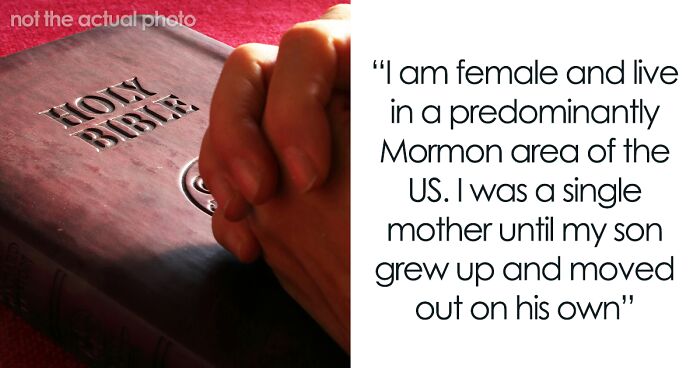
Mormons Won’t Leave This Woman Alone, So She Asks For Ways To Scare Them Off And People Deliver
Interview With ExpertAs long as we have free will, we can choose who or what to believe in. However, religious faith in particular seems to be on decline, with almost one-third of U.S. adults saying they don’t belong to any religious group. They report making such a decision mainly because they have doubts about religious teachings and don’t believe in higher power.
This woman no longer had faith in Mormonism after becoming disillusioned around 12-years-old. However, since then, other members have been very persistent in convincing her to return. Finally having enough, she started plotting how she’s going to teach them a lesson and even turned online for some advice.
Scoll down to find the full story and a conversation with professor of psychology and religious studies, Thomas G. Plante, Ph.D., ABPP and therapist specializing in LGBTQIA+ relationships and religious recovery, and owner of Anchored Counseling, Kelly R. Minter, who kindly agreed to talk with us more about losing faith.
The number of people who belong to a religious group is declining
Image credits: Getty Images / unsplash (not the actual photo)
This woman also decided to abandon her faith, but her community didn’t want to let her go
Image credits: Gabrielle Maurer / unsplash (not the actual photo)
Image credits: Curated Lifestyle / unsplash (not the actual photo)
Image credits: SweeperOfChimneys
“Often they feel that they can’t believe the dogma or don’t like many of the rules”
“It is very clear over the last decade or so that people are leaving their religions in higher numbers than we’ve previously seen,” says therapist and owner of Anchored Counseling, Kelly R. Minter.
“But I think a lot of that is because many religious organizations and belief systems refuse to allow for change, progress or evolution of our understanding of ourselves as humans and society as a whole. And so people have to decide not to evolve in order to stay in a religion, which is an unfair expectation.”
Professor of psychology and religious studies, Thomas G. Plante, Ph.D., ABPP, says that it’s not an easy decision for someone to give up their religion. “Often religious affiliation is also tied up with overall idenity, family relationships, and many other factors. Of course there is diversity in experience but as a rule, it is a challenge for many.”
“Typically people follow a religion because it speaks to them. When something resonates with who you are and when you build it into your identity, extracting that from yourself can be a lot of work. People who leave religions often spend time trying to figure out who they are without that huge part of their identity,” adds Minter.
People may choose to abandon their faith for many reasons. “Often they feel that they can’t believe the dogma or don’t like many of the rules. Often they feel disrespected or even abused,” says Plante. “For example, many people who are LGBTQI+ may feel rejected by their faith tradition and not welcomed. And many just don’t feel that they are getting what they want from the faith tradition.”
Minter also mentions disillusionment as a motive for leaving a religion. “Often a lot of the people that I work with leave because they realize something about themselves that can’t coexist with the doctrine of their faith, whether it’s their identity, their sexuality or their philosophy of the world in general,” she notes. “Other times, the people who follow the religion make the religion itself not something people want anything to do with anymore.”
Image credits: Getty Images / unsplash (not the actual photo)
“I don’t think it’s ever appropriate for anyone to try to persuade someone into a belief system”
Leaving a religion can not only be challenging but it can also have an impact on people, leading them to feel a mix of emotions. “Some feel unmoored, lack a community of engagement and support, or a bit adrift. Of course there is diversity of experience but faith traditions can offer many intangible benefits that people sometimes miss when they leave,” says Plante.
Some might feel happy having removed themselves from their religious community, as they are no longer weighed down by it, says Minter. At the same time, they can experience sadness because they miss the people, the rituals, and the identity that came with being a part of that religion, she says.
“Sometimes people lose their whole friend group or sometimes even their families when they leave religion and it can be really hard to start to trust again that people will still be there because you thought those people were your friends and you did life things with them for maybe years and then, when you decide that a belief system doesn’t fit you anymore, you become no longer acceptable to them…It’s going to make you question your worth to other people. Even outside of that religion,” Minter further explained.
Meanwhile, the religious community should respond to a person leaving their circle with respect, care, and compassion instead of pressuring them to return. However, “how religious communities should respond and how they do respond are two very different things,” says Minter. “If a religious community would respond in a way that cares for the person themselves and doesn’t pressure them to return, I think a lot more people would be open to returning to religion.”
“I don’t think it’s ever appropriate for anyone to try to persuade someone into a belief system,” Minter adds. “Leaving a door open for someone to enter back into a belief system that worked well for them at one time makes sense, but anytime you try to convince someone of something that they have discarded as not working for them anymore, it is usually more about the person doing the convincing and their needs than about the person who they are trying to convince,” she says.
Lastly, she concludes by saying, “As long as religions spend more time shaming the people who leave than they do caring for the people in the world that need caring for, they are going to continue to lose followers.”
Image credits: Rosie Sun / unsplash (not the actual photo)
Readers provided all sorts of hilarious advice for the author
Later, the author posted an update
Image credits: Curated Lifestyle / unsplash (not the actual photo)
Image credits: SweeperOfChimneys
Poll Question
Thanks! Check out the results:
I've never had Mormon missionaries show up at my door, but my first and only question would be "Tell me about your underwear."
Always ask such people for ID and if they show it, whip out your phone to take a picture of it, asking "is this your current address?" If they object, explain that they have YOUR address, it seems only fair you should have theirs. Then do what you like with the information....
I'd suggest donations to scientology in their name....I wonder if you can arrange scientology visitors?
Load More Replies...I really want a big dog. I’d buy it a big beef bone, stick a shoe on the end, and tell the door-knockers he’s just finishing up the last missionaries that trespassed on my property.
I've never had Mormon missionaries show up at my door, but my first and only question would be "Tell me about your underwear."
Always ask such people for ID and if they show it, whip out your phone to take a picture of it, asking "is this your current address?" If they object, explain that they have YOUR address, it seems only fair you should have theirs. Then do what you like with the information....
I'd suggest donations to scientology in their name....I wonder if you can arrange scientology visitors?
Load More Replies...I really want a big dog. I’d buy it a big beef bone, stick a shoe on the end, and tell the door-knockers he’s just finishing up the last missionaries that trespassed on my property.

 Dark Mode
Dark Mode 

 No fees, cancel anytime
No fees, cancel anytime 




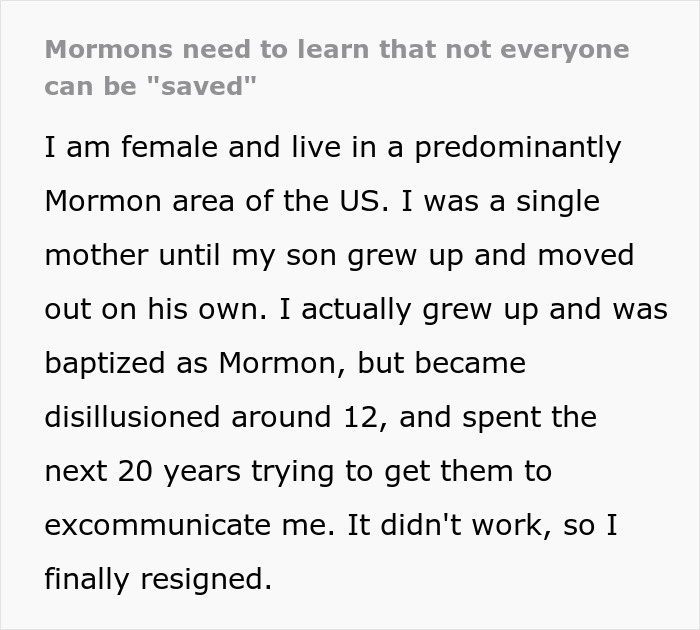
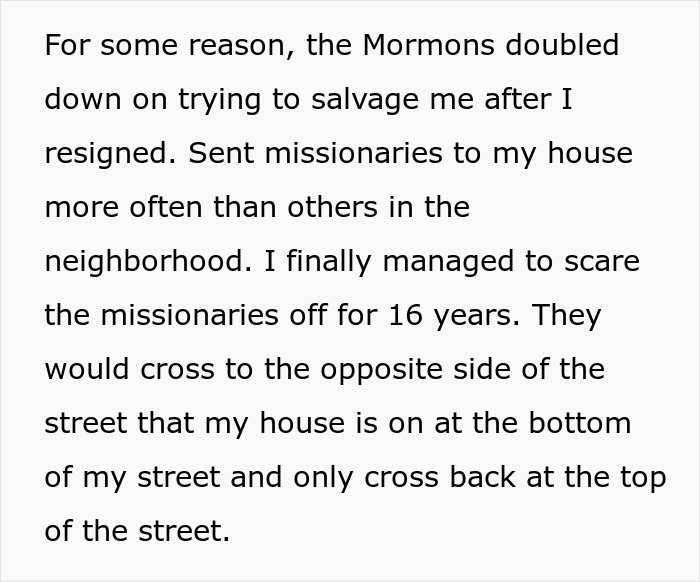



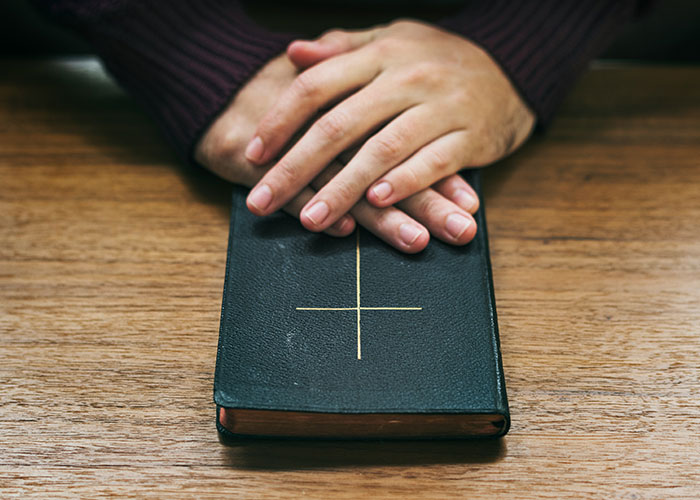
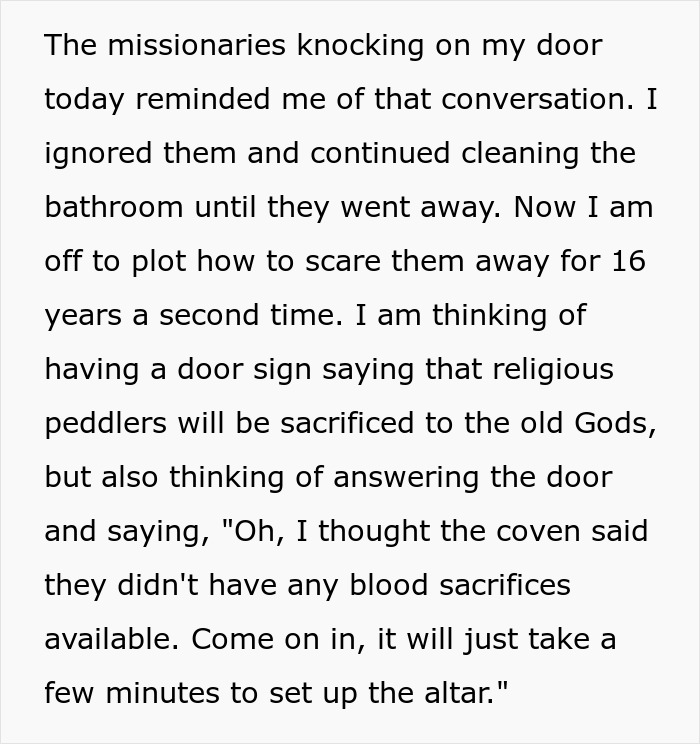
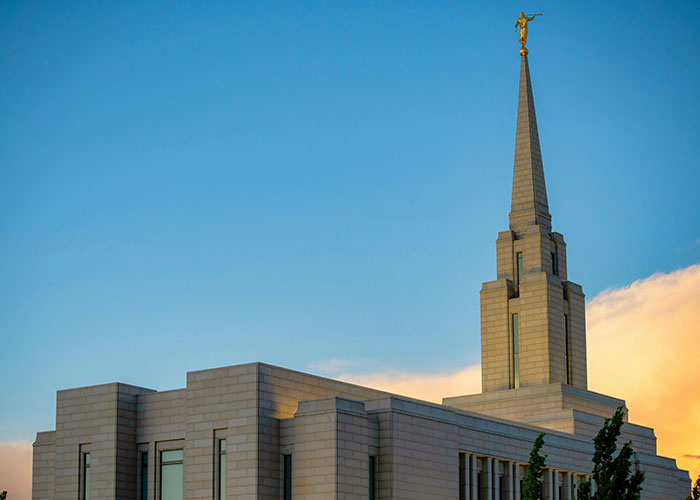
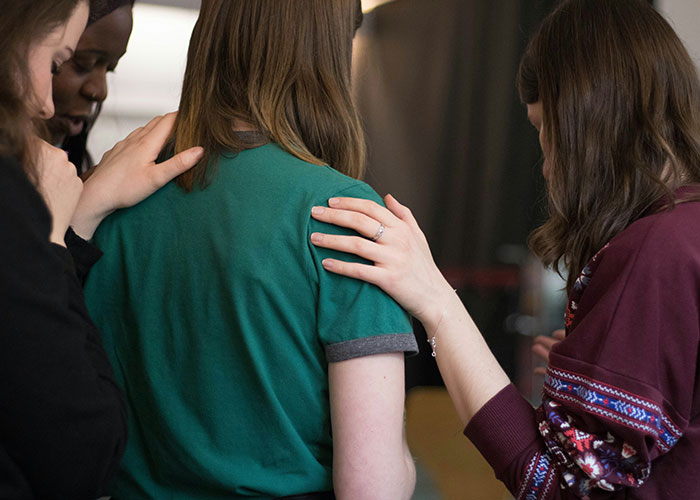



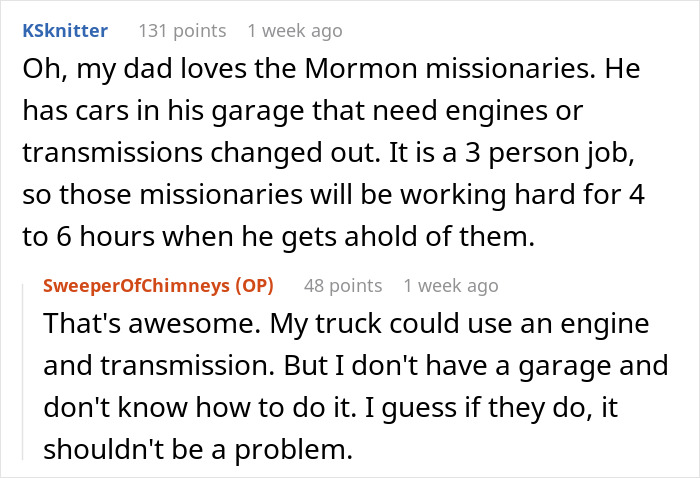


















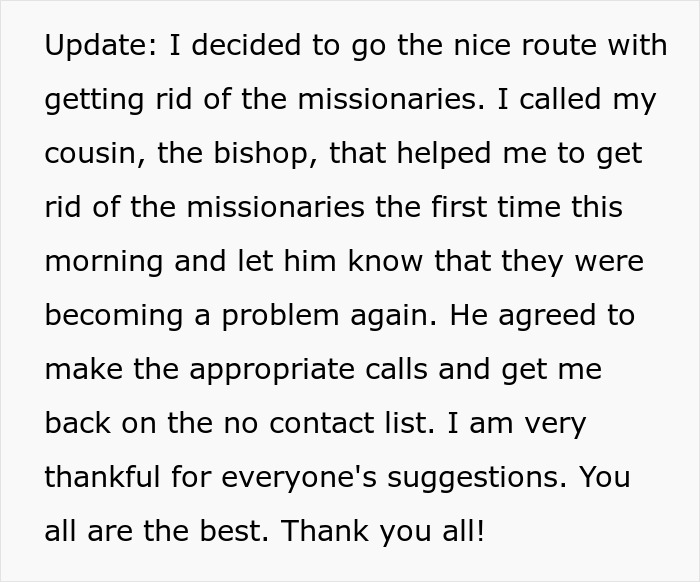

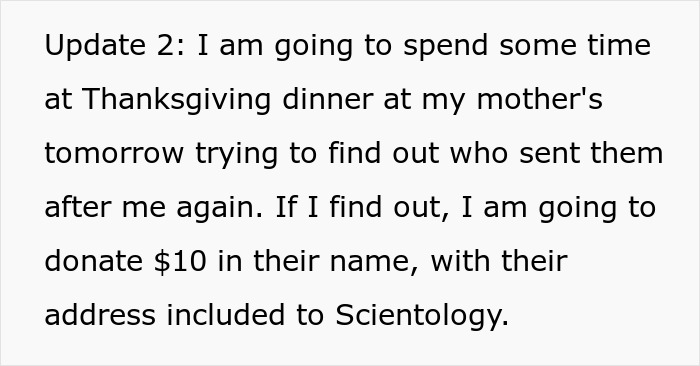
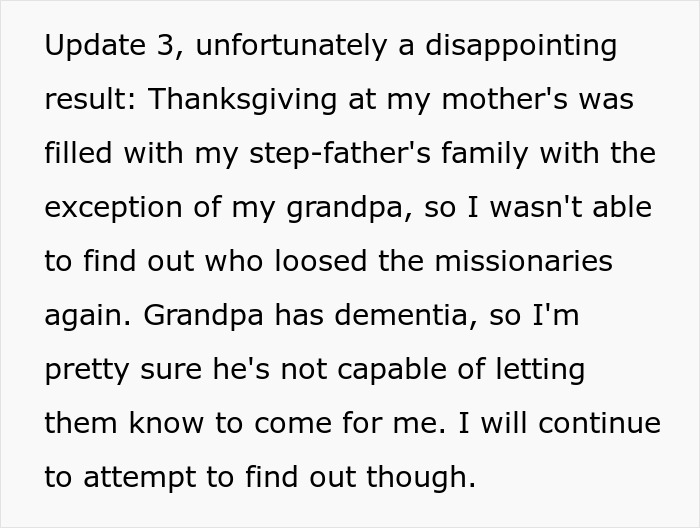







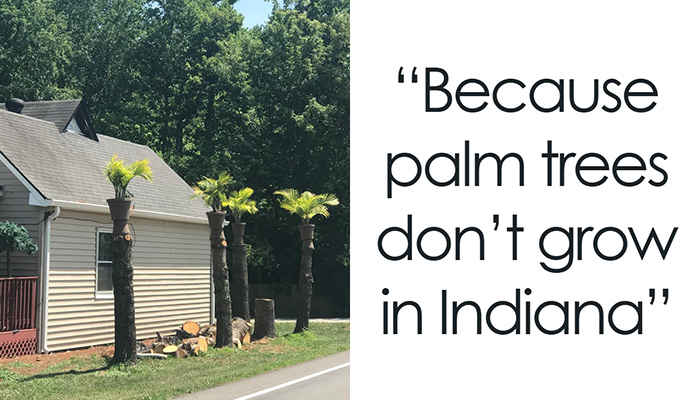





































53
95